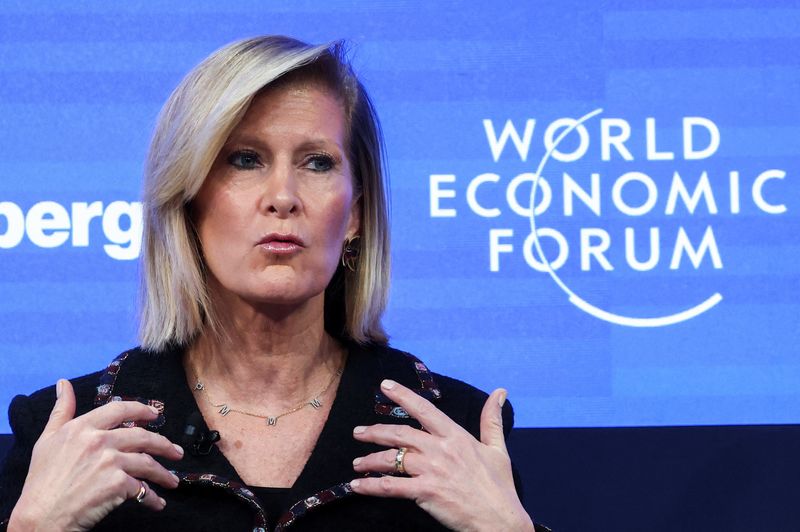Banks running Trump ‘war rooms’ as bosses prepare for trade ructions
2025.01.21 14:57
By Sinead Cruise and Lawrence White
DAVOS, Switzerland (Reuters) – JPMorgan Chase & Co (NYSE:) bankers worked through the night in a “war room” to assess the impact of U.S. President Donald Trump’s inauguration-day executive orders, while global markets braced for volatility following his return to the White House.
Trump revoked nearly 80 executive actions by former Democratic President Joe Biden within hours of his second presidential oath of office, including orders for an immediate freeze on new federal regulations and government hiring.
“The last 24 hours are showing there’s going to be a lot of changes we all have to digest,” JPMorgan Chase & Co head of asset and wealth management Mary Callahan Erdoes told a panel discussion at the World Economic Forum in Davos, Switzerland.
“At JPMorgan we have a war room set up to analyse and evaluate each and every one of these, so they have been up all night and are working on it.”
The white-knuckle business of trading global assets sensitive to Trump’s “America First” policies has resumed, brokers told Reuters, pointing to a rapid fall in the Canadian dollar against its U.S. counterpart, seconds after the president said a 25% tariff on Canadian goods could land within days.
Such changes and a possible increase in market volatility – sparked by Trump’s unpredictable use of social media as observed in his first term as president – will require adjustments but, the bankers and traders said, rewards are there for those who can navigate this.
“Time will tell but a lot of this is exactly what you would do to have a very pro-business environment,” Erdoes said, reflecting on Trump’s early executive order to ban remote working for federal staff.
“Thank God the U.S. government has done it, and hopefully that’ll keep us ahead of other governments in the world so we can continue to compete.”
Global trade flows will suffer from “interesting ructions” as the new Trump administration settles in, Standard Chartered (OTC:) CEO Bill Winters told the Davos meeting.
“We’ll see what comes through in terms of tariffs…but we know China is a big part of that in terms of having a gigantic export surplus, and that will be under attack from all parts of the world,” Winters said.
Chinese officials are hopeful their country can avoid a repeat of the bruising trade wars that drove a wedge between the world’s two economic superpowers during the last Trump administration in 2017-21, despite the returning president’s robust comments on potential tariffs during his campaign.
Big, globally-focused banks will be able to benefit from that disruption in their roles connecting between markets, Winters said, while locally-focused banks may struggle.
‘REGULATION HAS BEEN STIFLING’
As well as disruption from the change in administration in the United States, banks face a slew of fresh regulations they say impede their ability to fuel a push for global growth.
“Look, regulation has been stifling,” BNY CEO Robin Vince said. “It’s really against the whole purpose that governments around the world have in trying to enable growth for their countries.”
The Bank of England said on Friday it would delay tougher bank capital rules by a year to January 2027 to get clarity on what the United States will do under Trump, prompting the European Union to say it would also weigh its options.
The standards written by the global Basel Committee are the final set of international reforms designed to make the banking system safer after the 2008 global financial crisis, and are meant to be implemented by member jurisdictions.
“This is a good time to take a step back and think about what works in regulation and what doesn’t,” Winters said, flagging his scepticism about where so-called “end-game” Basel 3.1 bank capital regulation would land, given an array of delays and revisions announced in several major markets.
BNY’s Vince concurred. “We need the right regulation, it needs to be supportive, but it needs to be in furtherance of the growth goal,” he said.

In a separate World Economic Forum session covering innovation and the drive for economic prosperity, Santander (BME:) executive chair Ana Botin said Europe needed to press pause on new regulation and supervision reforms.
“There is much more we (Europeans) can do … This is not different from what the American government wants to do,” she said. “We just need to do more and faster, and for once be ahead of the United States.”








